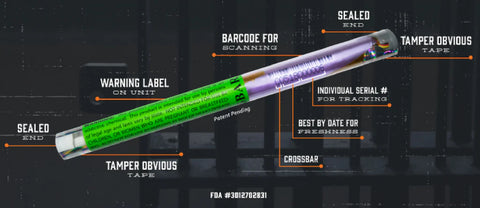Prisons Fight Tobacco Use with Vaping
This year has seen the increase in countries willing to jail vapers, as featured in our travel vape blog. However, there are some that are doing quite the opposite and encouraging prisoners to try vaping.
Due to the dangers of secondhand smoke, smoking has been prohibited in most jails for many years. But what about vaping? More and more prisoners are switching to vaping as a tobacco substitute as e-cigarette use becomes more widespread. In this post, we'll look at the restrictions on vaping in jails and prisons and its advantages and dangers.
Earlier this year, the Isle of Man Prison concluded a six month trial period of allowing access to vaping devices to inmates and even more recently, disposable vape devices are for sale at the commissary shop. The experiment was conducted after restlessness and illicit practices followed an outright smoking ban.
Prisoners were reportedly attempting to smoke everything from banana peels and tea bags to cut up nicotine patches, as well as causing numerous power outages while trying to light materials using kettles and other means not made for that purpose. Not having the desire to try and enforce even stricter rules on inmates, the prison decided to try a different approach, allow prisoners to buy and use vaping devices in cells and recreational areas. No one expected what was to come next.

Benefits of Vaping in Prison
Vaping may improve the atmosphere of the institution as a whole. Unlike traditional cigarettes, E-cigarettes like disposable vapes don't produce ash, which can pose a fire risk. E-cigarettes also don't have the same overpowering smell as conventional cigarettes, which can irritate other prisoners and employees.
Vaping might potentially be a reasonably priced alternative for prisons. On the other hand, you can purchase E-cigarettes in bulk quantity and use again. Conventional cigarettes can be pricey to buy and distribute. Long-term financial savings from doing this will free up more funds for use in other pressing needs.
How Do Prisons and Jails Regulate E-Cigarettes?
State governments and individual jails decide the rules for smoking in prisons. You can establish state-specific, municipal, county, and individual jail policies regarding tobacco use in detention facilities. The state can write strong tobacco policies that forbid selling, possessing, and using tobacco products, including e-cigarettes, for these environments.
For instance, the inmate commissary in Rhode Island state prisons does not allow carrying or selling any tobacco products, their accessories, or any ENDS (electronic nicotine delivery systems). Additionally, it is against the law for inmates to use or possess illegal tobacco products or any electronic cigarette on any Department of Corrections (DOC) property in South Dakota's state prisons.
Both laws effectively ban the sale, ownership, and use of e-cigarettes by incarcerated persons, which is their intended outcome.
E-cigarette goods marketed to jails and prisons claim that they were created especially for these establishments. The items are one-time use, non-refillable, and disposable. They don't have any metal in them that may be a weapon.
They also employ low-voltage batteries, making it impossible for them to function as a fire starter or a charger for other gadgets. Companies that market these goods to prisons and detention centers frequently highlight advantages like boosting inmate morale, creating income for the establishment, and lowering smuggling.

How Do Prisons and Jails Sell E-Cigarettes to Incarcerated People?
Only people who are incarcerated can purchase e-cigarettes from a correctional facility in a legal manner. Prisoners can purchase E-cigarettes at the prison canteen or commissary with cash deposited into an inmate's commissary account by a friend or family member or with money earned from work at the jail.
For instance, the Pennsylvania Department of Corrections offers e-cigarettes through its commissary to men confined in the general prison population for $5.37 plus tax apiece. Another method involves friends and family directly buying e-cigarettes for someone behind bars.
For instance, an e-cigarette vending machine in the main lobby of a county jail in Tennessee sells e-cigarettes ($10 each) separately from its normal commissary. Customers can use cash or Inmatesales.com to make payments. Then, the prisoner receives electronic cigarettes from the institution.

Risks of Vaping in Prison
Vaping in jail comes with additional dangers. The main danger is that people can use e-cigarettes to consume illegal substances like marijuana or synthetic narcotics. This may raise questions about the safety of other prisoners and personnel and may result in disciplinary punishment.
There are also questions concerning the safety of e-cigarettes. E-cigarette batteries have a history of exploding, harming people, and damaging property. Further, there is not much research on the long-term impacts of vaping, so it's unclear what kind of health hazards there may be.
Vaping in jail can potentially result in addiction and withdrawal symptoms. Prisoners who use e-cigarettes run the risk of developing a dependence on nicotine and developing cravings when they can't vape. Inmates may exhibit disruptive conduct, making it more challenging to reintegrate into society once they are free.
In the past several years, vaping has become popular among young people. Vaping has unquestionably become a cultural phenomenon, particularly in the United States.
Why is Vaping Popular Among Inmates?
Vaping's recent surge in popularity has already resulted in the formation of many groups, including those who support it and view it as a safer option than traditional smoking and those who are anxious about the unfavorable consequences of e-cigarettes. The latter viewpoint has given rise to criticism of vape liquids. However, vaping has shown to be increasingly common.
Despite the dangers, vaping remains common among prisoners for several reasons. For starters, convicts sometimes lack access to traditional cigarettes or other tobacco products due to restrictions or high prices. A more affordable and available option is vaping.
Additionally, given the highly stressful environment of jail, e-cigarettes are frequently viewed as a way to manage stress and anxiety. Additionally, some prisoners can use vaping to protest the limitations placed on them.
Some prisoners might vape to kill time and beat boredom. Vaping might give momentary relief and a sense of joy because inmates don't have many hobbies and entertainment options. It is crucial to remember that using a vape in most prisons is still against the law, and doing so can get you in trouble.

The Dangers of Smoking in Prison
It's vital to remember that smoking and vaping can be risky in a correctional facility, even though traditional smoking may offer some advantages. Smoking poses a severe health danger to convicts and employees and can start fires. Smoking can also result in punishments, including privilege suspensions and time spent in seclusion.
Additionally, smoking while incarcerated might significantly impact a prisoner's mental health. Prison life can be stressful and anxious, promoting smoking and worsening mental health problems. Inmates forced to smoke in specified locations or denied the ability to smoke may feel irritated, further contributing to a violent and uncomfortable environment.

Currently there average cost of sustaining a prisoner in the U.S. is around $30,000/year. With more facilities using the markup on vaping materials, that could put a pretty significant dent in the issue of taxpayers fitting the bill for them. While of course it wouldn’t erase the cost, it could have a large effect on the amount.
Looking at all these factors, it is surprising why any facility would prefer illicit means and more aggressive inmate as opposed to legal, fund raising devices that will help decrease the aggravation by many prisoners. Hopefully, the U.S. will continue to move forward and will take heed based on the success of the U.K.’s vaping program, not only for the monetary income to help upkeep but to help truly rehabilitate some inmates in at least one way while they’re inside.














